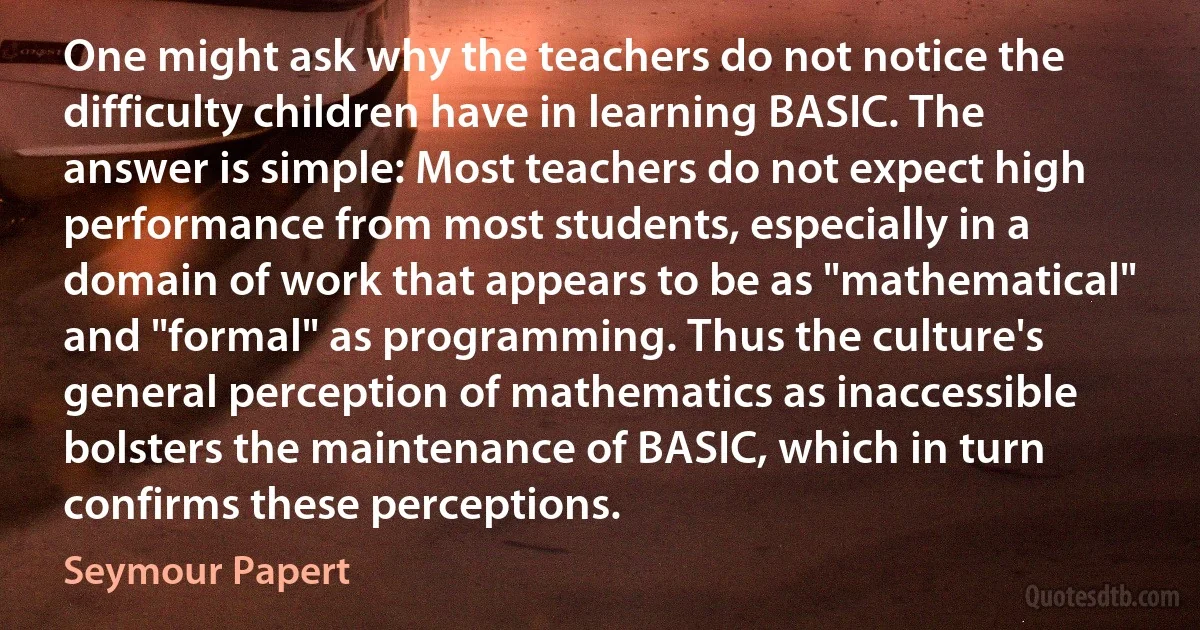Seymour Papert quotes
Now, given that picture of a rapid change of society, one would expect to see a rapid evolution of the institutions charged with preparing the young for it. We do not see this. We see a much slower rate of evolution of the school and that means we're seeing a bigger and bigger gap between school and society. This gap is what I believe is responsible for the deterioration of performance in our schools and our educational systems. Because the children can see this; they can see that school is irrelevant. They feel that the pace of school and the mood of the school culture is out of sync with the society in which they live. And so it becomes harder and harder to get them to buy into the idea that school is satisfying their needs, that school is a bridge to the 21st century, as our political leaders keep on reiterating.

Seymour Papert
The kind of mathematics foisted on children in schools is not meaningful, fun, or even very useful. This does not mean that an individual child cannot turn it into a valuable and enjoyable personal game. For some the game is scoring grades; for others it is outwitting the teacher and the system. For many, school math is enjoyable in its repetitiveness, precisely because it is so mindless and dissociated that it provides a shelter from having to think about what is going on in the classroom. But all this proves is the ingenuity of children. It is not a justifications for school math to say that despite its intrinsic dullness, inventive children can find excitement and meaning in it.

Seymour Papert
BASIC is to computation what QWERTY is to typing. Many teachers have learned BASIC, many books have been written about it, many computers have been built in such a way that BASIC is "hardwired" into them. In the case of the typewriter, we noted how people invent "rationalizations" to justify the status quo. In the case of BASIC, the phenomenon has gone much further, to the point where it resembles ideology formation. Complex arguments are invented to justify features of BASIC that were originally included because the primitive technology demanded them or because alternatives were not well enough known at the time the language was designed.

Seymour Papert
In many schools today, the phrase "computer-aided instruction" means making the computer teach the child. One might say the computer is being used to program the child. In my vision, the child programs the computer and, in doing so, both acquires a sense of master over a piece of the most modern and powerful technology and establishes an intimate contact with some of the deepest ideas from science, from mathematics, and from the art of intellectual model building.

Seymour Papert
It is not uncommon for intelligent adults to turn into passive observers of their own incompetence in anything but the most elementary mathematics. Individuals may see the direct consequences of this intellectual paralysis in terms of limiting job possibilities. But the indirect, secondary consequences are even more serious. One of the main lessons learned by most people in math class is a sense of having rigid limitations. They learn a balkanized image of human knowledge which they come to see as a patchwork of territories separated by impassable iron curtains.

Seymour Papert
Our children grow up in a culture permeated with the idea that there are "smart people" and "dumb people". The social construction of the individual is as a bundle of aptitudes. There are people who are "good at math" and people who "can't do math." Everything is set up for children to attribute their first unsuccessful or unpleasant learning experiences to their own disabilities. As a result, children perceive failure as relegating them either to the group of "dumb people" or, more often, to a group of people "dumb at x" (where, as we have pointed out, x often equals mathematics). Within this framework children will define themselves in terms of their limitations, and this definition will be consolidated and reinforced throughout their lives. Only rarely does some exceptional event lead people to reorganize their intellectual self-image in such a way as to open up new perspectives on what is learnable.

Seymour Papert

